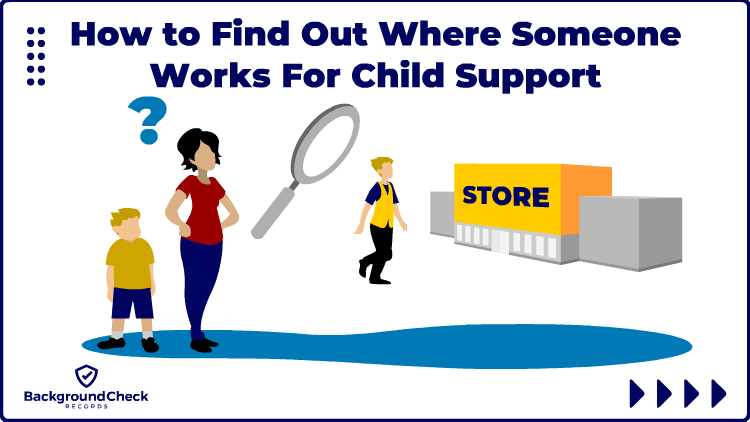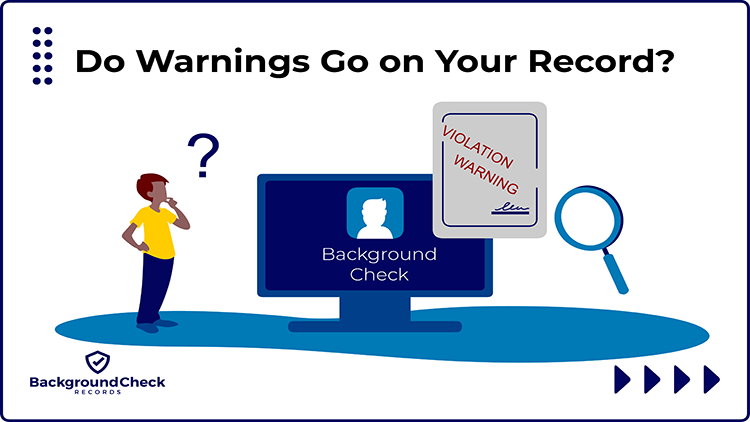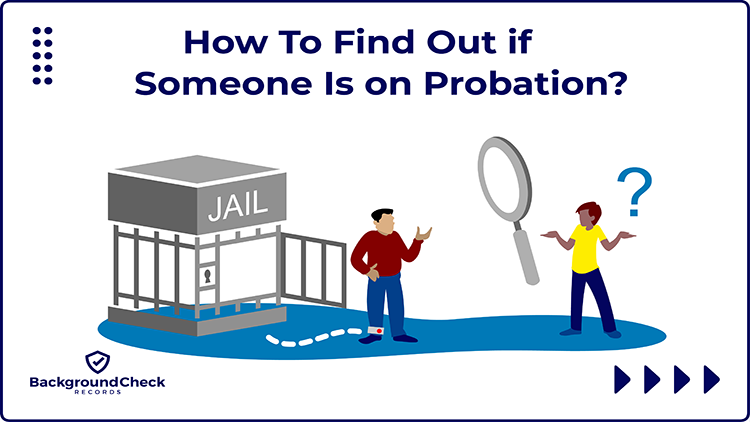How To Find Out Where Someone Works for Child Support Legally
Those wondering how to discover where someone works for child support legally aren’t alone because approximately ¼ of all children under the age of 18 live in single-parent households with nearly 30% who didn’t receive any child support payments at all. 1, 2
In some cases, the custodial parent, which is the person that has the child with them the majority or all of the time, may not even know where the other parent is located or where the other parent works.
Luckily, there’s multiple ways to the absent parent such as through public records databases, the free search form above, and there’s even government programs that help to find them too.
How To Find Out Where Someone Works When They Owe Child Support
Finding out where someone works for child support starts with looking at local, state, and federal agencies. Some of these databases are searchable by the general public, others are accessible only by child support enforcement courts and agencies to determine where someone is working. Understanding how the system works can help find out where your ex works to start the process of receiving child support.
Federal Parent Locator Service Is How To Discover Where Someone Works for Child Support
The United States Department of Health and Human Services has oversight of the Federal Parent Locator Service. This service is used by state child support enforcement agencies to locate a parent who is ordered to pay child support. This is how to find out where someone works on the federal level.
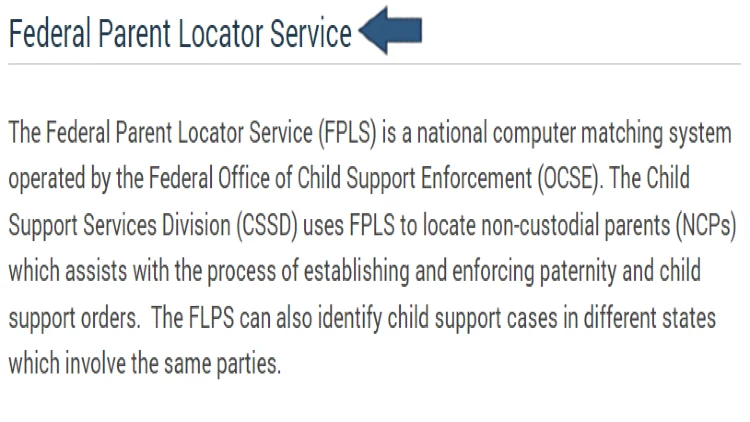
The federal Office of Child Support Enforcement provides assistance to 54 state and territory child support agencies to help ensure families who are due child support are receiving the payments as ordered with the Federal Parent Locator Service (FPLS) being central to the process. The FPLS includes:
- Oversight and maintenance of the National Directory of New Hires (NDNH).
- Oversight of the Federal Case Registry (FCR) database which lists all the active child support orders in the country.
- Enforcement of the Federal Offset Program (FOP) which helps collect back child support. Back child support is money that was ordered to be paid but was not. This is the program that will intercept a tax return for the parent ordered to pay when payment has not been made.
- Enforcement of the Federal Administrative Offset Program which intercepts other federal payments such as grants or disbursements from federal programs.
- Cooperative program with the United States Department of State for the denial of passports to parents owing more than $2500 in child support. This program is known as the Passport Denial Program (PDP).
- Administration of the Multistate Financial Institution Data Match (MFIDM) which allows the program to access financial data allowing them to find assets that may help satisfy the child support obligation.3
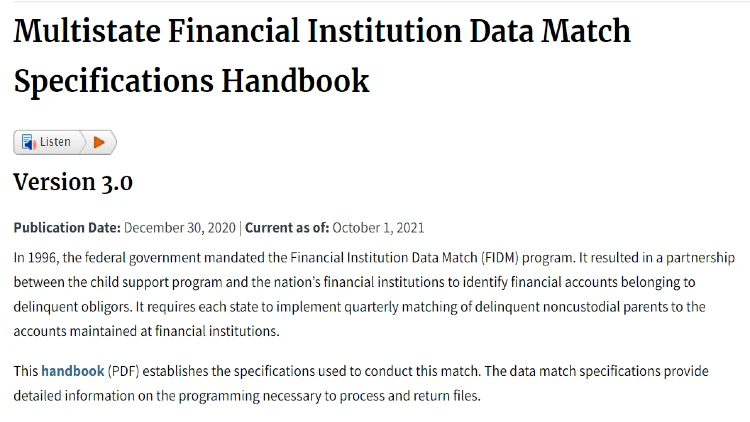
Information from the FPLS is limited to the following individuals:
- State child support agencies,
- Attorneys for state child support agencies
- Child support courts, court agents.
- State child welfare agencies.
- State foster care programs.
- Certain court officials in kidnapping/child custodial interference cases.3
FPLS is a secure database that helps states find out if someone works at a company when that person owes child support; however, enforcement is typically left to the state level.
The table below lists the new hire agency for each state.
| State |
Agency |
| Alabama |
Alabama Department of Labor |
| Alaska |
Alaska Department of Revenue, Child Support Services Division |
| Arizona |
New Hire Reporting Center |
| Arkansas |
New Hire Reporting Center |
| California |
Employment Development Department, New Employee Registry |
| Connecticut |
Office of Economic Security, New Hire Reporting Employer Services Portal |
| Delaware |
State Directory of New Hire Reporting |
| Florida |
Florida Department of Revenue, Child Support Services for Employers |
| Georgia |
New Hire Reporting Center |
| Hawaii |
Child Support Enforcement Agency |
| Idaho |
Idaho Department of Labor |
| Illinois |
Child Support Services, New Hire Reporting |
| Indiana |
New Hire Reporting Center |
| Iowa |
Child Support Enforcement |
| Kansas |
Department of Labor, New Hire Directory |
| Kentucky |
Cabinet for Health and Family Services, New Hire Reporting Employer Services Portal |
| Louisiana |
Department of Children and Family Services, New Hire Directory |
| Maine |
Department of Health and Human Services, New Hire Portal |
| Maryland |
New Hire Reporting |
| Massachusetts |
Child Support Division |
| Michigan |
New hire Child Support Program |
| Minnesota |
New Hire Reporting Center |
| Mississippi |
Mississippi Department of Human Services, State Directory of New Hires |
| Missouri |
Missouri Department of Social Services |
| Montana |
Department of Public Health and Human Services, Child Support Services Division |
| Nebraska |
State Directory of New Hires |
| Nevada |
Department of Health and Human Services, Division of Welfare and Supportive Services |
| New Hampshire |
New Hampshire Employment Security |
| New Jersey |
Child Support Employer Services Portal |
| New Mexico |
New Hire Directory |
| New York |
Department of Taxation and Finance |
| North Carolina |
Department of Health and Human Services, Division of Social Services |
| North Dakota |
North Dakota Child Support |
| Ohio |
Ohio Directory of New Hires |
| Oklahoma |
Oklahoma Employment Security Commission |
| Oregon |
Department of Justice, Child Support |
| Pennsylvania |
Pennsylvania Career Link |
| Rhode Island |
Rhode Island New Hire Reporting Directory |
| South Carolina |
South Carolina New Hire Reporting |
| South Dakota |
Department of Labor and Regulation |
| Tennessee |
Department of Human Services, New Hire Reporting Program |
| Texas |
Texas Child Support Portal |
| Utah |
Utah ID |
| Vermont |
Department of Labor |
| Virginia |
New Hire Reporting Center |
| Washington |
Department of Social and Health Service, Economic Services Administrative |
| West Virginia |
Health and Human Resources, New Hire Reporting Center |
| Wisconsin |
Department of Workforce Development, New Hire Reporting Center |
| Wyoming |
New Hire Reporting Center |
These state agencies work with the local child support enforcement program to make sure those agencies can help find someone who owes child support. These agencies also know how to find out someone’s salary for child support to make sure the child is receiving the maximum amount due.
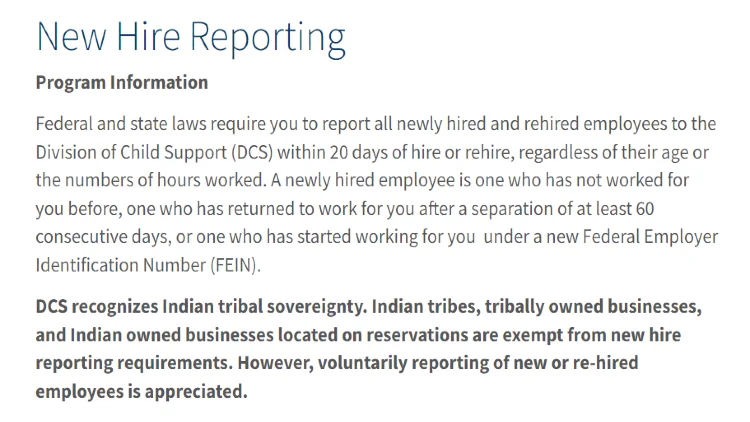
Locating a physical address for someone could mean pinpointing where they work, but could also include a mailing address.
How To Locate a Parent’s Physical Address for Child Support Notices
Locating a physical address for someone can be done in a variety of ways. One way is to search voter registration records in a county or state. Voter registration is considered public record, and some areas provide a mailing address for the individual voter; however, you will need the full name and date of birth of the person registered in cases to look up voter registration.
For example, Montana’s voter registration link requires a date of birth to search. This is one way to find out who lives here when looking for a physical address. A physical address is necessary to serve someone with notice of child support obligations.
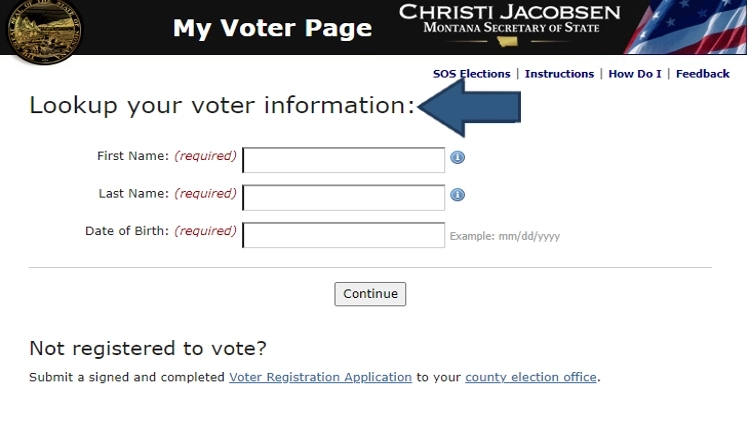
Local county clerk’s offices also maintain property records that can be searched online in a number of cases to help locate a physical address for someone who owes child support. This is only beneficial if the person owns the property for which they are taxed in that region.
Another way to locate someone’s address is to use a third-party search site. This carries a fee and results may or may not be up to date.
In addition to knowing how to locate a parent who owes child support, it’s important to know how child support works and how cases get started.
How Child Support Cases Work: Everything You Need to Know
Child support obligations can be agreed upon by the parents of the child without court involvement, called a voluntary service agreement; however, most child support cases require assistance from the state child support enforcement program and the local courts
When learning how to discover where someone works for child support and where paternity is questioned, a court must intervene to establish not only the child support amount, but whether or not the person identified as the father is the biological parent, and find the father when paternity has been determined.
Determining the amount of child support a person will pay each month depends on a number of factors in addition to state laws. Some things that are considered when determining the child support amount include:
- Income earned by both parents (some states only consider the noncustodial parent’s income, but most states look at both incomes)
- Amount of time each parent has the child in their physical custody
- The age of the child or children
- The number of children
- Which parent carries insurance on the child or children
- Childcare costs and who pays the childcare expenses
- If there is anyone else in the household with the children, and if that person contributes to the household expenses.
- Other factors the judge may consider relevant to the support of the child (such as education expenses, medical needs not covered by insurance, or supplemental income from either party such as bonuses or incentive pay).
Starting child support in most cases requires a court order, and all child support must be in compliance with state and federal laws. State agencies use a child support calculator that factors in the list above to determine the amount.
For example, California has an online child support calculator accessible to the general public to help the custodial parent get an estimate of the child support due. Factors that California uses to determine child support include the income of both parties, number of children, who carries insurance, and other support provided.4
Establishing Identity in Child Support Cases
Before a child support obligation can be ordered by a court, identifying the biological parent is key. Establishing paternity refers to conducting a DNA test to establish the male identified as the father is the actual biological parent.
Establishing parentage involves the court ordering the male submit to a DNA test which is then compared to the DNA of the child or children. Once the results confirm the person is the biological father, the court can then order that person to pay child support.
When DNA testing is ordered by the court, it must be done by an approved lab that follows the “chain of custody” for the sample. This simply means there are checks and balances in place to ensure the sample collected is for the person being tested, and the results are passed to the appropriate authorities for official use.5
State and Federal Child Support Laws
Each state has its own child support enforcement laws, and the federal government has passed legislation to help strengthen those laws. In 1992, Congress passed the Child Support Recovery Act which made failure to pay child support a misdemeanor offense. While this helped to an extent, many parents refusing to pay were not deterred by a misdemeanor charge.6
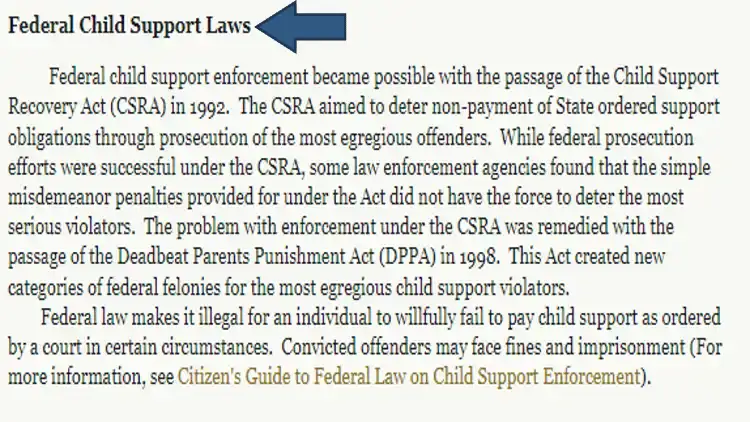
In response, Congress passed the Deadbeat Parents Punishment Act in 1998 to create a federal felony charge for those parents who had thousands in back child support that was unpaid.6
These laws help state agencies that are designated as Title IV-D agencies when it comes to enforcing child support and holding nonsupport offenders accountable.6
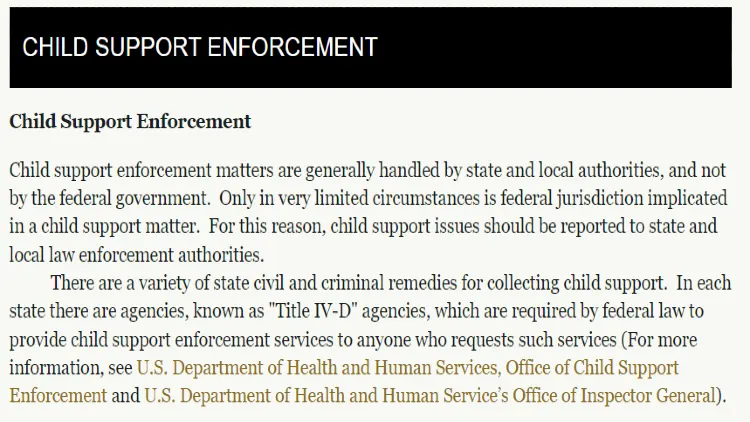
State laws are enforced by the state agency that is designated by statute to provide support to families seeking child support. State agencies also oversee the process of establishing paternity in child support cases.
State Child Support Enforcement: How it Works
State agencies that manage child support enforcement and determination in each state are known as Title IV-D agencies. By working under state and federal statutes, these agencies help locate parents who owe child support, help establish the child support amount, work closely with families and the courts to make sure child support obligations are being met, and educate the public on child support enforcement in their state.
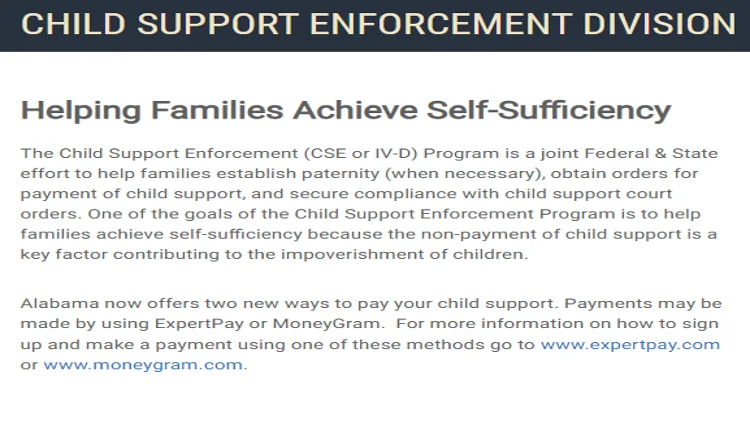
The table below lists the child support enforcement department for each state and the state child support statute or policy.
| State Child Support Enforcement Authority |
Child Support Statute or Policy |
| Alabama Child Support Enforcement Division
500 North Ripley Street
Post Office Box 304000
Montgomery, Alabama 36130-4000
334-242-9300 |
Rule 32 of Judicial Administration |
| Alaska Child Support Services Division
550 West 7th Avenue, Suite 310
Anchorage, Alaska 99501-6699
970-269-6900 |
Civil Rule 90.3 |
| Arizona Child Support Services
Centralized Mail Unit
Post Office Box 40458
Phoenix, Arizona 85067
602-252-4045 |
Revised Statute 25-320 |
Arkansas Department of Finance and Administration, Child Support
[email protected]501-324-9057 |
9-14-240 |
| California Child Support Services
Post Office Box 419064
Rancho Cordova, California 95741-9064
866-901-3212 |
Family Code 4053 |
| Connecticut Support Enforcement Services
287 Main St
East Hartford Connecticut 06118
800-228-5437 |
Family Law Chapter 7 |
| Delaware Division of Child Support Services
Post Office Box 11564
Wilmington, Delaware 19850
302-577-7171 |
Title 13 |
| Florida Department of Revenue
Contact is via electronic means
305-530-2600 |
61.30 |
| Georgia Division of Child Support Services
3626 Walton Way Extension
Suite Number 2
Augusta, Georgia 30909
877-423-4746 |
Senate Bill 427 |
| Hawaii Child Support Enforcement Agency
Office of Child Support Hearings
601 Kamokila Boulevard Room Number 436
Kapolei, Hawaii 96707
808-692-7110 |
Hawaii Family Court Child Support Enforcement Guidance |
| Idaho Department of Health and Welfare Child Support
601 Pole Line Rd.
Twin Falls, Idaho 83301
800-356-9868 |
Judicial Rule 126 |
| Illinois Child Support Services
Post Office Box 19405
Springfield, Illinois 62794-9405
800-447-4278 |
750 ILCS 5/505 |
| Indiana Department of Child Services, Child Support
402 West Washington Street
Indianapolis, Indiana 46204
800-840-8757 |
Indiana Rules of Court, Child Support Guidelines |
| Iowa Department of Human Services, Child Support
Post Office Box 9125
Des Moines, Iowa 50306
888-229-9223 |
Chapter 9 Child Support Guidelines |
| Kansas Child Support Services
555 South Kansas Ave.
Topeka, KS 66603
888-757-2445 |
Statute 38-2277 |
| Kentucky Child Support Enforcement
P.O. Box 14059
Lexington, KY 40512-4059
800-248-1163 |
403.212 |
| Louisiana Child Support Enforcement
1546 Gretna Boulevard
Harvey, Louisiana 70058-5366
888-524-3578 |
RS 9:315 |
| Maine Child Support Services
109 Capital St.
11 State House Station
Augusta, ME 04333
207-624-4100 |
Title 19-A |
| Maryland Child Support Administration
311 W. Saratoga St.
Baltimore, Maryland 21201
800-332-6347 |
Family Law 12-101 |
| Massachusetts Child Support Enforcement Division
67 Millbrook Street Suite 300
Worcester, Massachusetts 01606-2844
800-332-2733 |
119A |
| Michigan Health and Human Services Support Enforcement
51111 Woodward Ave.
Pontiac, Michigan 48342
877-543-2660 |
Family Support Act |
| Minnesota Child Support Enforcement
444 Lafayette Road
St Paul, Minnesota 55155
651-431-4400 |
256.741 |
| Mississippi Department of Human Service, Child Support
200 S. Lamar Street
Jackson, Mississippi 39201
601-359-4500 |
43-19-101 |
| Missouri Department of Social Services, Child Support
615 Howerton Ct
Post Office Box 2320
Jefferson City, Missouri 65102-2320
866-313-9960 |
452.340 |
| Montana Child Support Services Division
CSSD Central Mailing
Post Office Box 202943
Helena, Montana 59602-2943
406-444-6856 |
Title 37, Chapter 62, Subchapter 1 |
| Nebraska Department of Health and Human Services, Child Support
301 Centennial Mall S,
Lincoln, NE 68509
402-471-3121 |
Nebraska Judicial Branch Article 2 |
| Nevada Division of Welfare and Support Services, Child Support
300 E. 2nd St., Suite 1200
Reno, Nevada 89501
800-992-0900 |
Chapter 125B |
| New Hampshire Child Support Enforcement
129 Pleasant Street, Suite #4,
Concord, New Hampshire 03301
603-271-4427 |
Chapter 458C |
| New Jersey Child Support
29 Cottage St,
Jersey City, New Jersey 07306
877-655-4371 |
Rules of Court Appendix IX-A |
| New Mexico Child Support Enforcement Division
Post Office Box 2348
Santa Fe, New Mexico 87504
800-283-4465 |
NMSA 40-4-11.1 |
| New York Child Support Services
30 Clinton Avenue
Albany, New York 12084
888-208-4485 |
Family Court Act |
| North Carolina Child Support
Post Office Box 20800
Raleigh, North Carolina 27619-0800
800-992-9457 |
NCGS 50-13.4 |
| North Dakota Child Support
Post Office Box 7190
1600 East Century Avenue Suite 7
Bismarck North Dakota 58501 |
CHAPTER 75-02-04.1 |
| Ohio Department of Job and Family Services, Child Support
Post Office Box 182380
Columbus, OH 43218-238
800-686-1556 |
JFS 07766 |
| Oklahoma Child Support Services
Post Office Box 248822
Oklahoma City, Oklahoma 73124405-522-2273 |
Article 4, Establishment of Support |
| Oregon Department of Justice, Child Support
Post Office Box 14680
Salem, Oregon 97309 |
Rules 137-050 |
| Pennsylvania Child Support Program
25 South Front St,
Harrisburg, Pennsylvania 17101
877–727-7238 |
Chapter 43, Title 23 |
| Rhode Island Office of Child Support
77 Dorrance St.
Providence, Rhode Island 02903
401–458-4400 |
15-5-16.2 |
| South Carolina Department of Social Services, Child Support
1535 Confederate Ave.
Columbia, South Carolina 29201-1915 800–768-5858 |
Title 63 |
| South Dakota. Department of Social Services, Child Support
700 Governors Dr.
Pierre, South Dakota 57501
605-773-3165 |
Codified Law 25-7 |
| Tennessee Child Support Program
505 Deaderick St.
Nashville, Tennessee 37243-1403
615-313-4880 |
CHAPTER 1240-2-4 |
| Texas Child Support Enforcement
Post Office Box 12548
Austin, Texas 78711-2548
800-252–8014 |
Family Code Chapter 154 |
| Utah Child Support Services
195 N 1950 W
Salt Lake City, Utah 84116
801–536-8500 |
Chapter 12 Utah Child Support Act |
| Vermont Office of Child Support
Post Office Box 1310
Williston, Vermont 05495
800-786-3214 |
Title 15, Chapter 11, Subchapter 003A |
| Virginia Child Support
801 East Main St
Richmond Virginia 23219-2901
800-468-8894 |
20-108.2 |
| Washington Division of Child Support
Post Office BOX 11699
Tacoma, Washington 98411-6699
800-442-5437 |
Chapter 26.19 |
| West Virginia Bureau for Child Support Enforcement
350 Capitol Street Room 147,
Charleston, West Virginia 25301
304-558-3780 |
Chapter 48, Domestic Relations |
| Wisconsin Child Support Program
201 W Washington Ave
Post Office Box 8916
Madison, Wisconsin 53703-8916
608-422-7000 |
767.511 |
| Wyoming Child Support Program
2300 Capitol Ave
Hathaway Building C
Cheyenne, Wyoming 82002
307-777-6948 |
20-2-301 |
These state agencies have access to the Federal Parent Locator Service and this is how to learn where someone works for child support in the most efficient, cost effective method that’s available to the custodial parent.
The Title IV-D state agency can find out where the noncustodial parent works, start the proceedings to get child support established, enforce the child support order, and file the necessary action when a child support order is not being followed.
What Happens When Child Support Payments Are Not Being Made?
When child support payments are not being made, the state agency can file a motion with the court for the violation. The agency can alert state and federal revenue departments to withhold tax refunds to help satisfy child support payments.
The courts can also issue a warrant for the arrest of the individual. In some states, the amount of bond on a child support warrant is equal to the back child support due. For example, in North Carolina, a person can be arrested on a child support warrant for being $2000 behind on payments. The court will establish a cash bond of $2000 which will go to satisfy the obligation when the person posts bail.
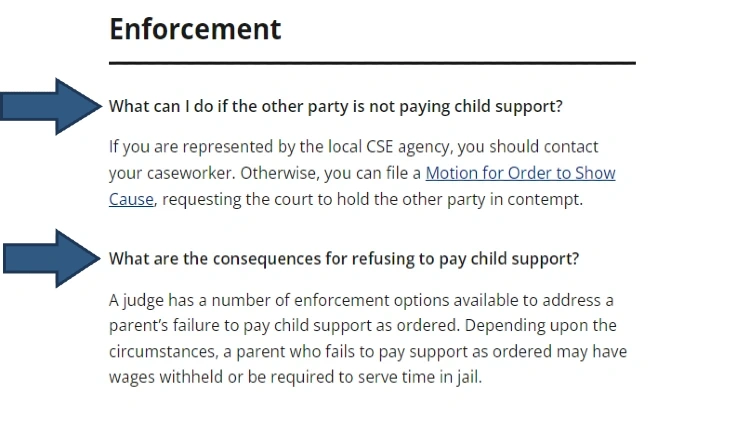
Employers also need to know how to determine if an employee is in police custody due to a child support warrant when they fail to show up for work.
A warrant is only one way the state can try to enforce a child support order or obligation. Another option is wage garnishment. Knowing how to learn where someone works for child support also helps the state agency start wage garnishment processing to satisfy the obligation.
Wage Garnishment and Child Support: What a Parent Needs to Know
When a person is not making their child support payments, their wages from their employment can be garnished to help satisfy the child support obligation. Garnishment simply means the money is taken out of the paycheck before the person receives it.
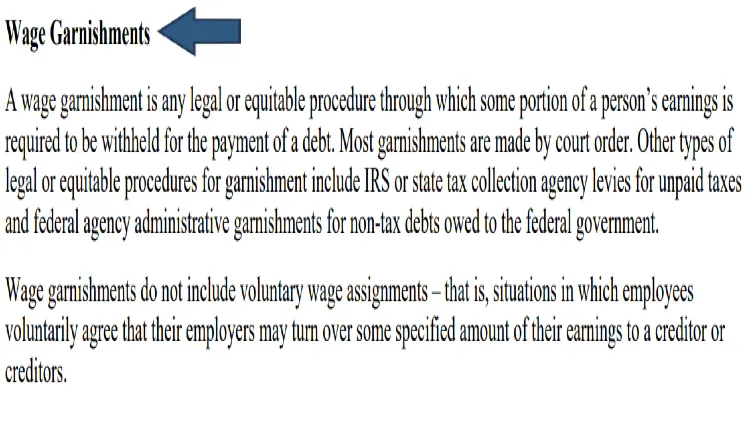
The Title IV-D state agency petitions the court to order garnishment when child support payments are not being made in some cases. Other states allow garnishment without a court order. The state agencies locate someone’s place of employment for garnishment and send the necessary notices to the employers.
The state agencies use the FPLS for assistance in how to find where someone works for garnishment to make sure their records are up to date, and to track those individuals who move from state to state to avoid child support.
The table below lists the wage garnishment laws for each state, as well as limitations on garnishment and the laws, discuss how to learn where someone works for child support.
State agencies that petition or file for wage garnishment use a calculator to determine the exact amount to be taken from the paycheck. That is why it is vital to know how to discover where someone works for child support. Failure to pay child support can have other consequences than garnishment or loss of tax refunds which could include jail time.
Does Child Support Appear on a Background Check?
Since child support can be part of a family court order, it can be considered a public record and may appear on a background check. Failure to pay child support can reflect on a person’s credit history, and may also appear on a background check as a contempt charge for failure to comply.
While child support isn’t a standard on most background checks, there is a possibility it could show up on one. Additionally, garnishment requests are sent directly to the employer which alerts them of a child support obligation.
In order to fill the gap of children who are not receiving the support they need, states are working diligently to enforce support orders. These agencies know how to discover where someone works for child support, legally enforce the court’s order, and notify the courts of noncompliance when necessary.
Frequently Asked Questions
Does a Child Support Warrant Appear On a Background Check?
A child support warrant or order for arrest may appear on a background check since it is a court record and considered public. Do warrants show up on background checks for child support? They can and sometimes do.
How Does Failure To Pay Child Support Affect Employment?
Failure to pay child support can result in wage garnishment which impacts the amount of take-home pay each pay period. Failure to pay could also result in an arrest warrant which can cause a person to miss work and possibly result in termination.
1 National Single Parent Day: March 21, 2022. (2022, March 21). Census Bureau. Retrieved September 23, 2022, from <https://www.census.gov/newsroom/stories/single-parent-day.html>
2 44% of Custodial Parents Receive the Full Amount of Child Support. (2018, January 30). U.S. Census Bureau. Retrieved September 23, 2022, from <https://www.census.gov/newsroom/press-releases/2018/cb18-tps03.html>
3 Overview of Federal Parent Locator Service | The Administration for Children and Families. (2011, December 29). The Administration for Children and Families. Retrieved September 23, 2022, from <https://www.acf.hhs.gov/css/training-technical-assistance/overview-federal-parent-locator-service>
4 Guideline Calculator | CA Child Support Services. (n.d.). CA Child Support Services. Retrieved September 23, 2022, from <https://childsupport.ca.gov/guideline-calculator/>
5 Establishing Paternity and Legal Paternity Testing – HomeDNA Paternity. (2021, August 31). DNATesting.com. Retrieved September 23, 2022, from <https://dnatesting.com/establishing-paternity-and-legal-paternity-testing/>
6 Child Support Enforcement. (2020, May 28). Department of Justice. Retrieved September 23, 2022, from <https://www.justice.gov/criminal-ceos/child-support-enforcement>

